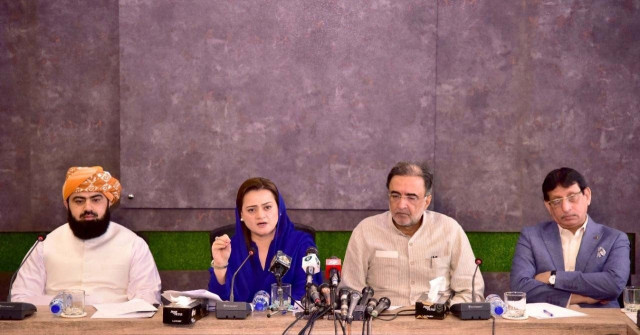Cabinet cobbles up plan to rein in debilitating energy crisis
Slashes 40% fuel quota; restores Saturday off to conserve energy

In a bid to balance its books amid a fierce squeeze on energy and shrinking room for spending, the federal cabinet on Tuesday decided to slash the fuel quota for itself as well as the government employees by 40 per cent while restoring Saturday holidays for the public sector as part of the government’s austerity measures.
In a post-cabinet meeting, chaired by Prime Minister Shehbaz Sharif, the government’s spokesperson announced that load-shedding will be reduced to two hours by June 30, adding that the impact of restoring the holiday will have an annual impact of $386 million and a $77 billion impact on the import bill.
LIVE #APPNews : Federal Minister for Information & Broadcasting @Marriyum_A along with Federal Ministers briefing media persons about the decisions taken in the federal cabinet meeting #Islamabad https://t.co/x529QbLJ5i
— APP 🇵🇰 (@appcsocialmedia) June 7, 2022
Federal Minister for Information and Broadcasting Marriyum Aurangzeb also revealed that the power ministry recommended changing Friday to a work-from-home day. She informed reporters that the premier has also constituted a committee in this regard to gauge the efficiency of the measure and inform the cabinet in its next meeting.
The move comes as hours-long power outages hit the country, with demand outstripping generation during the peak summer months. Soaring global fuel prices have also increased pressure on the external account and the local currency has hit record lows against the dollar.
"We are facing a severe crisis... We desperately need to take energy conservation measures. We need to tap on every option to save on energy," the information minister said.
The meeting further contemplated the early closure of markets to maximize the use of daylight as well as approved plans to work with provinces and the municipal authorities to keep street lights running on alternate nights to save energy.
For enhancing fuel efficiency and consumption, she said, the government along with provinces would increase the advisory and monitoring role to increase the tune-up centres for vehicles, saying proper maintenance’s overall impact is 40 to 50 per cent on vehicles. She said the cabinet has approved the plan in this regard, saying tune-up centres for tractors would also be increased.
In addition, Marriyum said, a national-level campaign would also be launched to create awareness at a micro and macro level. Under the conservation plan, the cabinet has also decided that the official meetings would be conducted virtually and through video links in order to avoid travelling.
The austerity measures are being taken as part of the government’s plan to rein in the cash crunch as well as minimise the use of power as the current demand for electricity is 28,400 megawatts and there is a gap of 4600 MW amid an extraordinary heat wave.
“If people are being asked to make sacrifices and go through hardships then so should the cabinet. The change has started from within the cabinet to reduce the burden on the public,” she said on slashing of fuel quota.
Marriyum said that the government has imposed a ban on the purchase of all types of vehicles, excluding ambulances, school buses and vehicles needed for solid waste management, for the current year as part of its austerity plan. The cabinet has also imposed a total ban on availing treatment from abroad by government officials and cabinet members, saying procurement and purchase of furniture have also been banned.
The foreign visits have also been banned, she said, adding that any purchase of office machinery would be done after a committee constituted in this regard approves it. The committee would decide if permission should be granted for obligatory visits by government officials.
In all the government offices, she said, lunch, dinner and high-tea have been banned, saying the inspection committee would keep an eye on such things. She added that the consumption of utilities at a government level and at offices would be reduced by 10 per cent.
Read Govt asked to consult traders on market hours
Energy-saving amid a surging shortfall
The information minister said that several reports were presented before the cabinet, including a presentation on the austerity measures, energy conversation measures and load management plan.
The Finance Division presented an austerity plan to the cabinet and the latter ruled that petrol entitlement of government functionaries, including cabinet members, will be cut by 40%.
Pakistan has experienced hours-long power cuts over the last month, with urban centres seeing four- to six-hour outages a day and rural areas over eight hours, as temperatures across the country soar - to 50 degrees Centigrade in some areas.
During the presser, the information minister said that the power ministry briefed the cabinet about loadshedding and the power situation in the country. She said there was currently a gap of 4,600 megawatts between supply and demand, with supply pegged at 21,000 megawatts and demand at 25,600 megawatts.
She alleged that the power projects remained incomplete during the PTI government. In the previous era of PML-N, she recalled, 14,000 megawatts were added to the power system in 2018.
The minister said that the prime minister has been holding meetings for the last two days to overcome the problem of load shedding, saying the duration of load shedding will be reduced to three-and-a-half-hour by June 15 and once the plants become operational after June 15, the duration of load shedding will be reduced to three hours.
The duration of load shedding will be further reduced to two and a half hours between June 25 and 29, she said, adding by June 30, the power outage will be reduced to 2 hours. She said that the cabinet also discussed in detail the renewable energy projects, including shifting to wind and solar energy.
On the proposal for early closure of markets, Marriyum said that meetings would be held between chief ministers, the National Economic Council (NEC), and the prime minister to decide how to take the business community and all stakeholders into confidence on the matter. She said that PM would also hold meetings with traders and business communities to take them into confidence before making a decision regarding the closure of markets.
'Free and fair general elections'
Addressing the press conference, Marriyum said that the cabinet also discussed a report of the Election Commission of Pakistan (ECP), saying different proposals were discussed in the meeting to make the next elections free, fair and transparent and enable the ECP to work efficiently, adding that the cabinet ruled that the report be discussed in parliament and form suggestions.
The cabinet has also discussed targeted subsidies. It also reiterated that all the allies of the government were taking ownership of the unpopular decisions that the government has taken, saying there was no other way than to adopt such measures.
JUI-F’s Minister for Communications Asad Mahmood said that the government had the option of further reducing the fuel prices and announcing elections when it came to power but it decided to steer the country out of difficulties by making some unpopular decisions, saying a permanent economic plan was being devised and before that emergency plans were being implemented.



















COMMENTS
Comments are moderated and generally will be posted if they are on-topic and not abusive.
For more information, please see our Comments FAQ